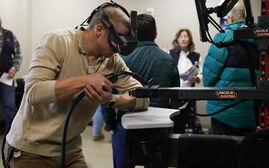Processing Your Payment
Please do not leave this page until complete. This can take a few moments.
- News
-
Editions
View Digital Editions
Biweekly Issues
- December 1, 2025
- Nov. 17, 2025
- November 03, 2025
- October 20, 2025
- October 6, 2025
- September 22, 2025
- + More
Special Editions
- Lists
- Viewpoints
-
Our Events
Event Info
Award Honorees
- Calendar
- Biz Marketplace
Nursing enrollment up 11% at Maine's public universities

A focused effort to expand nursing education in response to projected health care workforce shortages has expanded nursing enrollment in Maine’s public universities by 11% in the last seven years.
Vice Chancellor of Academic Affairs Robert Neely reported to the University of Maine System Board of Trustees on Monday that total nursing enrollment has grown from 1,734 in 2010 to 1,920 in fall 2017 across all degree programs.
The expanded enrollment is part of a strategic response by Maine’s universities to trends in Maine’s nursing workforce and increasing demand for health care services across a state that has the oldest median age in the nation. Even with the nursing enrollment increase, Maine faces a nursing workforce cliff that has been projected to hit the state by the middle of the next decade.
The Maine Department of Health and Human Services, in partnership with the Maine Nursing Action Coalition, sponsored a nursing workforce summit at UMaine last October to identify steps to increase Maine’s nursing education capacity and thereby avoid the shortage of 3,200 nurses projected by the middle of the next decade.
UMaine System tackles projected nursing shortfall
Neely updated the UMaine System’s board of trustees on a number of university and policy initiatives already underway as a result of that summit.
Among them:
Exploration of standardized state nursing curriculum: OMNE Nursing Leaders of Maine and Maine Nursing Action Coalition will hold a focused meeting in early 2018 to discuss opportunities for aligning the nursing curricula across the state. Practice leaders and nursing educators will be engaged in the discussion.
University of Maine at Fort Kent Initiatives: UMFK is collaborating with the University of Maine at Presque Isle to launch a nursing program at University of Maine at Presque Isle in fall 2018. UMFK has expanded nursing enrollment by more than 2,000% since 2001. To accommodate achieved growth and to continue to expand opportunities the campus is working with providers from throughout Northern Maine to expand clinical opportunities for students in the region.
UMFK, which launched the Rural U Nursing Pilot Program in the spring 2018, has 20 students participating from 16 different Maine high schools from Aroostook to Cumberland counties. Participating students take an introduction to professional nursing two-credit online course that includes the opportunity to practice professional nursing skills and participate in professional nursing activities. The course includes an in-hospital component. Tuition is free.
University of Maine initiatives: The University of Maine is on target to admit another 115 first-time nursing students to the School of Nursing in Orono in fall 2018 — a 35% increase over the first-time enrollment averages for the past 20 years.
UMaine is working with Bangor regional education and provider partners on a project to double clinical placements at an area health care facility. Pending successful completion of discussions that began at the nursing summit the pilot will launch in the fall.
UMaine also is creating a unique partnership with a local health care system, with a tenure-track faculty member actively working with the provider to improve partner outcomes. This faculty member would facilitate ongoing work that supports improved patient outcomes and creates a culture of integration and reciprocity between the two institutions.
UMaine plans to pilot an accelerated Nursing Outreach to Rural Maine program that would create a two-year pathway to a nursing degree for current baccalaureate degree holders looking to transition into a Maine career in nursing. The pilot will be launched in Orono to utilize existing clinical simulation resources and leverage new clinical placements in the Bangor region. Partnerships also are being formed to expand the fast-track pathway into nursing to the University of Maine at Machias to better serve the health care needs of Downeast coastal Maine. Nearly half of the registered nurses in Washington and Hancock counties are over the age of 55 and are expected to retire in the next 10 years.
Finally, UMaine and Penobscot Community Health Care have partnered on a grant submission to the Health Resources and Services Administration of the U.S Department of Health and Human Services. The grant proposals seeks to increase the number of nurses working in rural ambulatory, public health and community based centers. The proposal would include funding to add a full-time lecturer position in the UMaine School of Nursing to support enhancing clinical placements for undergraduate students and resources would assist nursing students who are fulfilling their community health rotations in rural areas serviced by Penobscot Community Health Care.
University of Southern Maine initiatives: USM has increased the numbers of clinical groups at community hospitals this spring and offered a first-ever winter clinical placement in mental health. USM established or increased placements with providers from Augusta to Portsmouth to help students work within their own communities.
USM also expanded its community partnership courses to include working with Partners for World Health and the VNA Home Health Hospice. These new partnerships join existing partnerships with Amistad, Bayside Community, Casco Bay Community, Dominican Republic, Healthy Aging/Elder Life, Sagamore Village, Rural Community, Kennedy Park, and L/A Community Care.
USM added a clinical placement coordinator to the staff to expand clinical placements for both undergraduate and graduate students and to enhance clinical coordination throughout the region.
USM is adding an adult gerontology acute care nursing practitioner concentration to the graduate program offerings. The graduates will be prepared to work with and serve Maine’s growing senior population, with York and Cumberland counties projected to have the largest increase in percentage of population over the age of 65 (25.3%) by 2022.
Mainebiz web partners
Related Content

The Giving Guide
The Giving Guide helps nonprofits have the opportunity to showcase and differentiate their organizations so that businesses better understand how they can contribute to a nonprofit’s mission and work.
Learn More
Work for ME
Work for ME is a workforce development tool to help Maine’s employers target Maine’s emerging workforce. Work for ME highlights each industry, its impact on Maine’s economy, the jobs available to entry-level workers, the training and education needed to get a career started.
Learn More
Groundbreaking Maine
Whether you’re a developer, financer, architect, or industry enthusiast, Groundbreaking Maine is crafted to be your go-to source for valuable insights in Maine’s real estate and construction community.
Learn more-
The Giving Guide
The Giving Guide helps nonprofits have the opportunity to showcase and differentiate their organizations so that businesses better understand how they can contribute to a nonprofit’s mission and work.
-
Work for ME
Work for ME is a workforce development tool to help Maine’s employers target Maine’s emerging workforce. Work for ME highlights each industry, its impact on Maine’s economy, the jobs available to entry-level workers, the training and education needed to get a career started.
-
Groundbreaking Maine
Whether you’re a developer, financer, architect, or industry enthusiast, Groundbreaking Maine is crafted to be your go-to source for valuable insights in Maine’s real estate and construction community.
ABOUT
NEW ENGLAND BUSINESS MEDIA SITES
No articles left
Get access now
In order to use this feature, we need some information from you. You can also login or register for a free account.
By clicking submit you are agreeing to our cookie usage and Privacy Policy
Already have an account? Login
Already have an account? Login
Want to create an account? Register
Get access now
In order to use this feature, we need some information from you. You can also login or register for a free account.
By clicking submit you are agreeing to our cookie usage and Privacy Policy
Already have an account? Login
Already have an account? Login
Want to create an account? Register









Comments